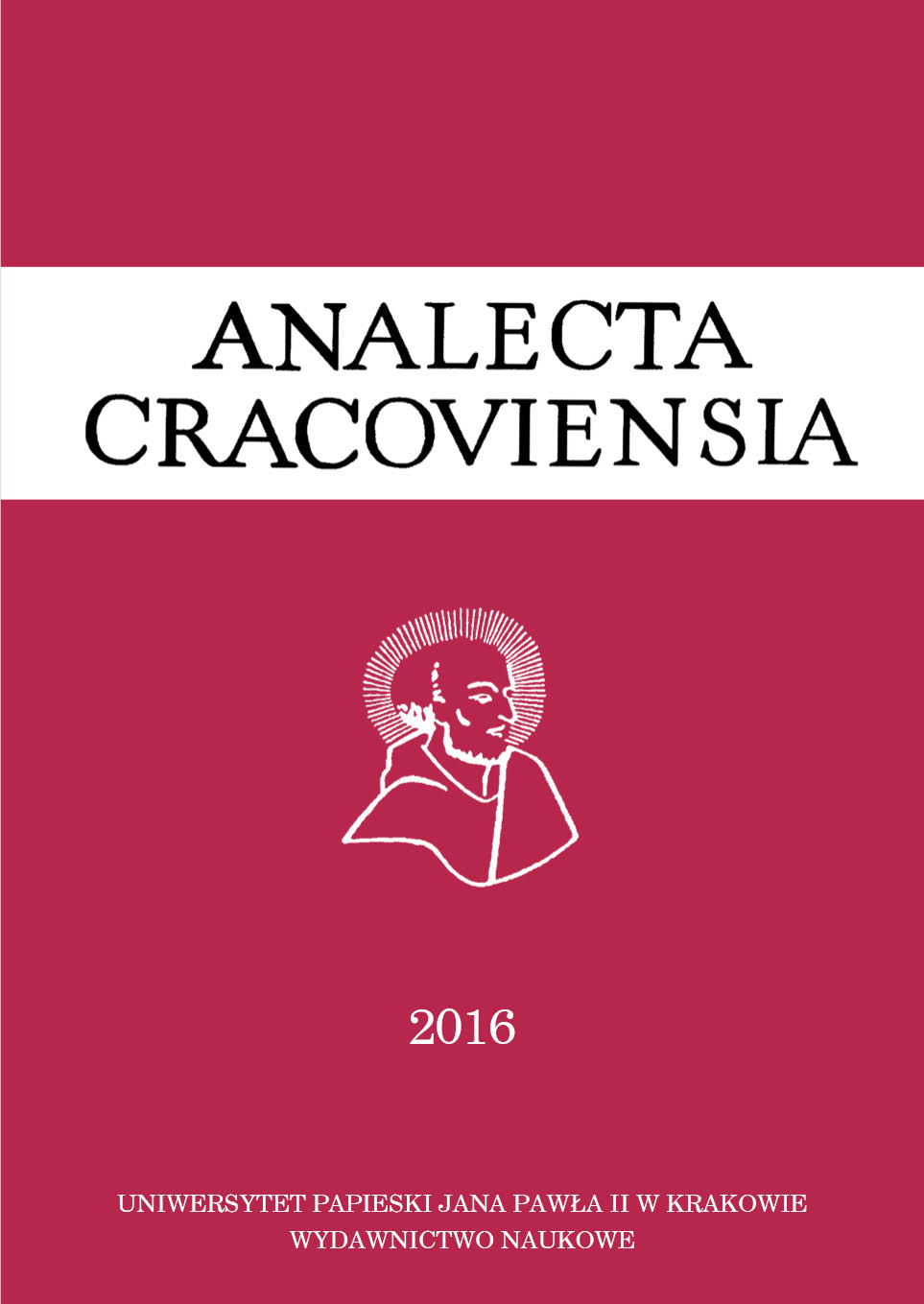Argumenty na nieistnienie Boga wobec teo-ontologii trynitarnej
DOI:
https://doi.org/10.15633/acr.2023Słowa kluczowe:
ateizm, teizm, dogmat trynitarny, teo-ontologia, egzystencjaAbstrakt
Analiza poszczególnych argumentów na nieistnienie Boga pokazuje, że w różnym stopniu dotykają one kwestii metafizycznych. Niektóre wprost zakładają odmienny model metafizyczny aniżeli ten przyjmowany przez teistów. Inne wydają się nie dotykać wprost kwestii metafizycznych, a poruszają się w innej przestrzeni – na przykład egzystencjalnej. Jednakże i te w pewien sposób są zapośredniczone metafizyczne, przez co zakładają konkretny obraz Boga i konkretny model ontologiczny, który również często różni się od modelu teistycznego.Niemniej nawet w przypadku, kiedy przyjęta metafizyka i model Boga są zgodne z myśleniem teistycznym, tzn. kiedy argumenty są wymierzone w kierunku filozoficznego Absolutu, nie oznacza to, że owe argumenty posiadają swoje znaczenie także względem Boga Trójjedynego. Dogmat o Trójcy dotyczy istoty Boga, która determinuje w kontekście stwórczym konkretny model metafizyczny. Niniejszy artykuł wobec takiej zależności poddaje analizie argumenty ateistyczne w świetle teo-ontologii, pytając, czy mieszczą się one w jej modelu.
Bibliografia
Baszczak B., Dotykanie egzystencji. Jeana-Luca Nancy’ego filozofia dekonstrukcji, Kraków 2016.
Bernard C. A., La Prière chrétienne. Étude théologique, Paris 1967.
Chimirri G., Teologia del nichilismo. I vuoti dell’uomo e la fondazione metafisica dei valori, Milano 2012.
Dawkins R., Bóg urojony, przeł. P. Szwajcer, Warszawa 2007.
Edwards D., Jak działa Bóg?, przeł. M. Chojnacki, Kraków 2013.
Greshake G., Trójjedyny Bóg. Teologia trynitarna, przeł. J. Trawa, Wrocław 2009.
James I., Nowa filozofia francuska, przeł. J. Bednarek, P. Juskowiak, Warszawa 2014.
Jaroszyński P., Meandry neoplatonizmu, „Człowiek w Kulturze” 13 (2000), s. 97–107.
Kowalczyk D., Teologiczna koncepcja uczestnictwa chrześcijanina w życiu trynitarnym według Hansa Ursa von Balthasara, „Warszawskie Studia Teologiczne” 17 (2004), s. 89–108.
Kunzmann P., Metamorfozy neoplatonizmu, „Poznańskie Studia Teologiczne” 22 (2008), s. 203–214.
Kupczak J., Teologiczna semantyka płci, Kraków 2013.
Levering M., Pismo Święte i metafizyka. Tomasz z Akwinu i odnowa teologii trynitarnej, przeł. M. Romanek, Kraków 2016.
Martelet G., Odnalezione życie wieczne, przeł. M. Krzeprowska, Kraków 2000.
Nancy J.-L., Être singulier pluriel, Paris 2013.
Neusch M., U źródeł współczesnego ateizmu. Sto lat dyskusji na temat Boga, przeł. A. Turowiczowa, Paryż 1980.
Nietzsche F., Antychryst, przeł. L. Staff, Warszawa 1907.
Pabjan T., Nieinterwencjonistyczny model działania Boga w świecie przyrody, „Tarnowskie Studia Teologiczne” 35 (2016) nr 1, s. 33–49.
Pabjan T., Anatomia konfliktu. Między nowym ateizmem a teologią nauki, Kraków 2016.
Pelikan J. J., Powstanie wspólnej tradycji (100–600), przeł. M. Höffner, Kraków 2008.
Piotrowski E., Teodramat. Dramatyczna soteriologia Hansa Ursa von Belthasara, Kraków 1999.
Rahner K., Vorgrimler H., Mały słownik teologiczny, przeł. T. Mieszkowski, P. Pachciarek, Warszawa 1987.
Rożdżeński R., Ateizm, czyli wiara negatywna. Ateistyczne przeświadczenia z perspektywy pytań granicznych, Kraków 2016.
Sartre J. P., L’être et le néant. Essai d’ontologie phénoménologique, Paris 2001.
Sobór Watykański II, Konstytucja duszpasterska o Kościele „Gaudium et spes”, [w:] Sobór Watykański II, Konstytucje, dekrety, deklaracje, Poznań 2002, s. 526–606.
Sokolowski R., Bóg wiary i rozumu. Postawy chrześcijańskiej teologii, przeł. M. Romanek, Kraków 2015.
Szczurek J. D., Trójjedyny. Traktat o Bogu w Trójcy Świętej jedynym, Kraków 2003.
Szwarc K., Wewnątrztrynitarna kenoza Boga źródłem i możliwością kenozy człowieka w świetle teologii Hansa Ursa von Balthasara, „Warszawskie Studia Teologiczne” 27 (2011) nr 2, s. 351–364.
Wąsek D., Aspekty językowe sporu o istnienie Boga, „Logos i Ethos” 31 (2011) nr 2, s. 61–73.
Weinandy T. G., Czy Bóg cierpi?, przeł. J. Majewski, Kraków 2003.
Woźniak R. J., Metafizyka i Trójca. Teo-ontologia trynitarna pomiędzy apofatyką i katafatyką, [w:] Metafizyka i teologia. Debata u podstaw, red. R. J. Woźniak, Kraków 2008, s. 270–304.
Pobrania
Opublikowane
Numer
Dział
Licencja
Obecnie autorzy publikujący w czasopiśmie udzielają jego wydawcy zgody o następującej treści:
- Autor zachowuje autorskie prawa majątkowe do utworu, a jednocześnie udziela wydawcy czasopisma zgody na jego pierwszą publikację w wersji drukowanej i wersji online na licencji Creative Commons Uznanie autorstwa 4.0 Międzynarodowe oraz zgody na wykonywanie opracowań, w tym przekładów.
- Autor ma możliwość udzielania zgody niewyłącznej na opublikowanie utworu w wersji, która ukazała się w czasopiśmie (np. zamieszczenia go w repozytorium instytucjonalnym lub opublikowania w książce), wraz z informacją o jego pierwszej publikacji w czasopiśmie.
- Autor może umieścić swój utwór online (np. w repozytorium instytucjonalnym lub na swojej stronie internetowej) jeszcze przed zgłoszeniem utworu do czasopisma.

